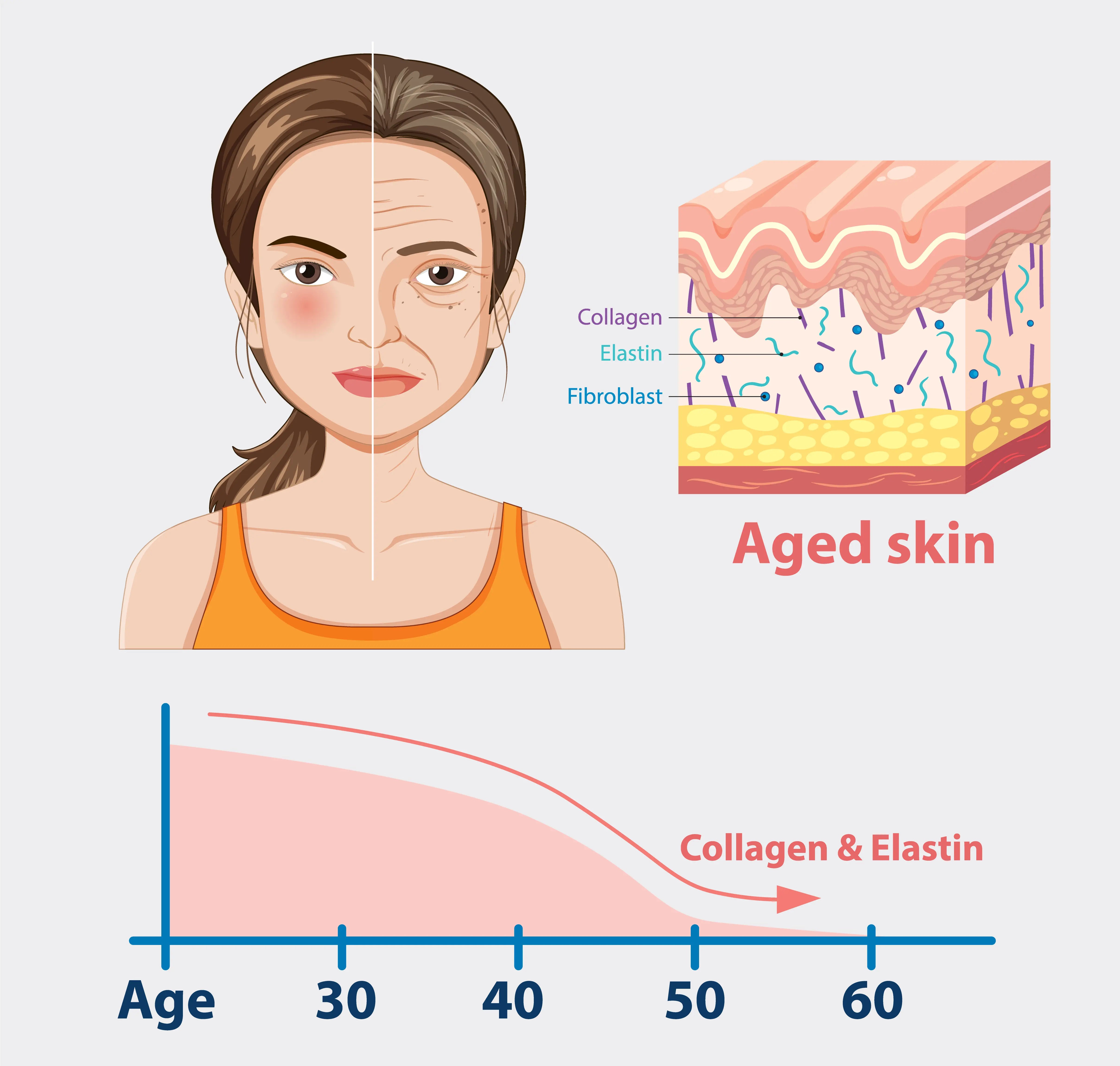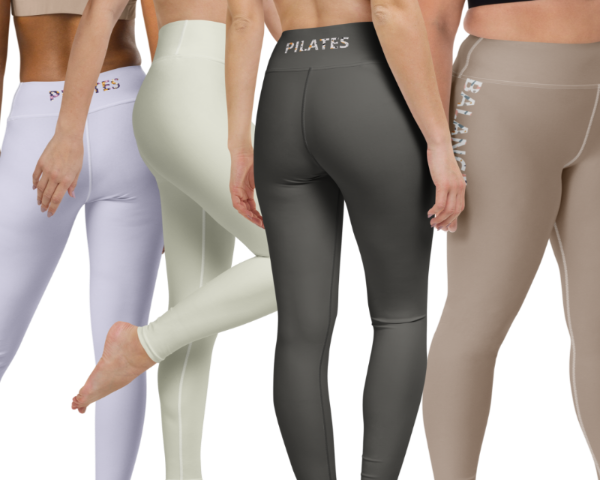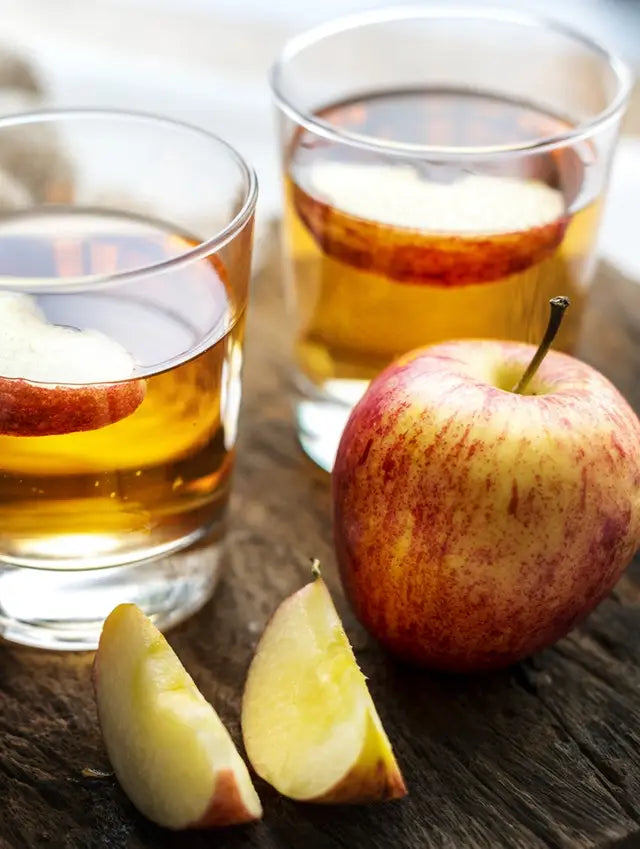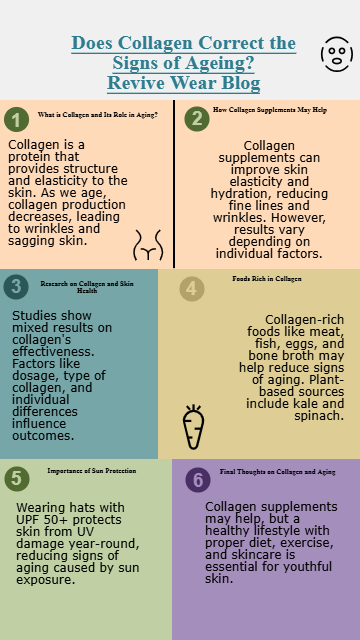Sugar, Spice and Everything Nice...with Free Shipping over $75!
Sugar, Spice and Everything Nice...with Free Shipping over $75!

Does Collagen Correct The Signs Of Ageing?-Revive Wear Blog
10 min read
Can collagen reverse aging signs?
As we age, our skin starts to show signs of wear and tear. Fine lines, wrinkles, and sagging skin can all contribute to an aged appearance. Many people turn to collagen supplements in the hopes of reversing these signs of ageing. But does collagen work?
The answer is: that it depends. Collagen supplements can help boost the production of collagen in your body, which can have a positive effect on the skin. However, other factors, such as sun damage and smoking, also play a role in the appearance of aging skin.
Let's examine collagen and its impact on the skin, along with other aging factors. We'll explore ways to enhance your skin's appearance through supplements and other methods.
What is Collagen?
Collagen is a protein that is found in abundance in our skin, bones, and connective tissues. It provides structure and elasticity to the skin, helping it to look plump and youthful. However, as we age, our bodies produce less collagen, leading to the formation of wrinkles and sagging skin.
There are many products on the market that claim to contain collagen and combat the signs of aging. But does collagen work? The answer is a little complicated.
How Does Collagen Help?
Collagen supplements are thought to help improve the skin's elasticity and hydration, reducing the appearance of fine lines and wrinkles. By replenishing the body's collagen levels, these supplements may help to restore a more youthful appearance.
At this point, it's still unclear whether or not collagen can completely erase the signs of aging. However there is some evidence that it may help improve skin elasticity and appearance.
Some studies have shown that collagen supplementation can improve skin elasticity and reduce the appearance of wrinkles. However, not all studies have found this to be the case. Additionally, collagen supplements can be expensive and may not be appropriate for everyone.
What Does the Research Say?
While some studies suggest that collagen supplements can improve skin elasticity and hydration, the results are not always consistent. Factors such as the type of collagen used, the dosage, and individual differences can all impact the effectiveness of these supplements.

So, does collagen help to correct these signs? According to experts, the answer is yes! Collagen is a key protein that helps to keep our skin looking youthful and healthy. By supplementing our diets with collagen (or using products that contain it), we can help our skin to look smoother, plumper and more elastic.
Should You Try Collagen Supplements?
As we age and experience menopause, unfortunately, our skin loses elasticity and strength, leading to sagging skin and wrinkles. Bad dietary decisions, smoking, stress, insomnia and weather also increase the rate of aging skin.
Our skin contains up to 70% collagen. Within the first 4years of menopause, the synthesis of collagen decreases by up to 30%.
Collagen represents a family of 28 different proteins and plays a role in the structure of tissues and joints including the skin and nails.
A new randomized, double-blind, placebo-controlled clinical study1 shows that taking Peptan® collagen peptides goes beyond just helping smooth wrinkles. The study provides powerful scientific evidence that the oral supplement reduces skin pore visibility and strengthens hair and proves these benefits happen at lower doses shown before.
When choosing a collagen product, be sure to read the ingredients list and look for products that contain hydrolyzed collagen or peptides. These ingredients are specially formulated to target the signs of aging.
If you are looking to improve the appearance of your skin and reduce the signs of ageing, collagen supplements may be worth a try. However, it's important to remember that results can vary from person to person. It's also essential to choose a high-quality supplement and to use it consistently for the best results.
What Types of Foods Contain Collagen and Do They Reduce the Signs of Aging?
Fortunately, collagen can also be found in certain foods, and it's thought that eating them may help to reduce the signs of aging. Some of the best sources of collagen include meat, fish, eggs and dairy products. However, there are also some plant-based sources such as bone broth, kale, and spinach.
So if you're looking for ways to reduce the signs of aging, adding more collagen-rich foods to your diet is a good place to start!
The Significance of Wearing Hats and Applying Sunscreen to Minimize Sun Damage

Final Thoughts
While collagen supplements may help to improve the signs of ageing, they are not a miracle cure. A healthy lifestyle, including a balanced diet, regular exercise, and proper skincare, is essential for maintaining youthful-looking skin.
Remember, ageing is a natural process, and it's important to embrace and care for your skin at every stage of life.
There's no doubt that collagen plays a big role in the health and appearance of our skin – so much so that many people swear by collagen supplements to help correct the signs of aging.
But does this work? The jury's still out on that one, as there's not a lot of concrete scientific evidence to support or refute the claims that collagen can help reduce wrinkles and promote younger-looking skin.
One thing is for sure, though: if you're looking for ways to improve the health and appearance of your skin, increasing your collagen intake is a good place to start. Luckily, there are plenty of ways to do this – from topical creams and supplements to diet and lifestyle changes.
Summary Points
- Loss of collagen as we age results in loss of skin moisture, elasticity and strength.
- It is possible to delay the aging skin by eating healthy, reducing stress, improving sleep, not smoking, protecting yourself from the weather and drinking plenty of water.
- Collagen can improve skin density, wrinkles, folds, and moisture among a few participants.
- Taking collagen may show variable effects per individual.
Asserin J et al. 2015 doi: .org/ 10.1111/jock.12174
Borumand M, Sibilla S 2014 doi: 10.2147/CIA.S65939
Prawitt J 2019 www.peptan.com/science/beauty-from-within
https://www.healthline.com/nutrition/collagen-benefits
https://www.betterhealth.vic.gov.au/health/conditionsandtreatments/healthy-ageing-the-skin
Plast Aesthet Res 2021;8:2.10.20517/2347-9264.2020.153© The Author(s) 2021 https://parjournal.net/article/view/3863
https://youtu.be/TTE-vbKh6Zo
https://www.verywellhealth.com/hydrolyzed-collagen-5082613#:~:text=Hydrolyzed%20collagen%20(HC)%20is%20an,promote%20weight%20loss%2C%20and%20more.
Photo by Mikhail Nilov: https://www.pexels.com/photo/woman-in-white-tank-top-holding-a-bottle-6706844/
https://www.freepik.com/free-vector/aging-skin-collagen-decrease_255890999.htm#fromView=search&page=1&position=8&uuid=70358ea1-93f1-414f-997a-e45cf8ed91cb&new_detail=true&query=aging+skin">Image by brgfx on Freepik
Revive Wear Disclaimer
Leave a comment
Comments will be approved before showing up.
Also in Sports Wear Blogs

Yoga vs Pilates: Which is Best for Flexibility & Toning
8 min read 1 Comment
This article provides a detailed guide of Pilates and Yoga, specifically tailored for busy mothers aiming to enhance their physical and mental wellbeing. It distills the choice between the two disciplines into a clear, goal-oriented framework.
Key points are as follows:
-
Core Strength & Postpartum Recovery: Pilates is positioned as the superior modality for targeted core rehabilitation. Its precise focus on the deep abdominal muscles and pelvic floor makes it exceptionally effective for postpartum recovery, improving posture, and building the functional strength required for the physical demands of motherhood.
-
Flexibility & Stress Management: Yoga is identified as the more potent practice for increasing overall flexibility and providing profound stress relief. Its integration of mindfulness, breathwork (pranayama), and meditation offers a direct path to calming the nervous system and achieving mental clarity amidst the chaos of family life.
-
Toning vs. Functional Strength: While both practices build strength, Pilates offers more direct and targeted muscle toning, particularly in the core. Yoga excels at developing holistic, functional strength and muscular endurance through full-body engagement.
-
The Mind-Body Connection: The article differentiates the mental benefits: Pilates quiets the mind through intense physical concentration, while Yoga achieves this through a more meditative and spiritual approach.
Conclusion: The post concludes that neither practice is categorically "better." The optimal choice is dependent on the individual's primary goal. It recommends Pilates for mothers prioritising foundational strength and targeted toning, and Yoga for those seeking flexibility and mental calm. For a comprehensive approach, the article advocates for a synergistic routine that incorporates both disciplines to achieve a balanced state of physical strength and mental wellbeing.

How to Make Workouts Feel Easier Drinking Coffee
16 min read 1 Comment
Coffee has received numerous claims that it provides health benefits in maintaining energy levels, mental focus, and aids in weight loss by appetite suppression.
In our blog we discuss:
- How Coffee can improve your speed and performance.
- How to stay focused and increase your energy levels.
- Find out if coffee really does burn fat.
- What role does coffee play in reducing post exercise muscle soreness?
- What is the best time to consume coffee prior to working out?
- Potential risks and side effect of coffee and what can you do to minimize these effects.

The Surprising Benefits and Dangers of Apple Cider Vinegar
4 min read
Recent Articles
- Yoga vs Pilates: Which is Best for Flexibility & Toning
- Does Collagen Correct The Signs Of Ageing?-Revive Wear Blog
- How to Make Workouts Feel Easier Drinking Coffee
- The Surprising Benefits and Dangers of Apple Cider Vinegar
- 3 Easy Healthy Recipes to Live a Better Life
- Common Issues Women Have About Workout Clothing
- The Ultimate Guide to Treadmill Workouts and How to Get the Most Out of Them
- Beginner Strength Training for Women
- Top Tips On How To Build Your Fun Circuit Routine
- 5 Reasons Why You’re Not Loosing Weight-Revive Wear Blog
About Revive Wear
We get it—you're juggling work, kids, and trying to squeeze in a workout somewhere between school drop-offs and bedtime. That's exactly why Revive Wear exists.Melissa Green
Founded in 2018 in rural NSW, Revive Wear was born from my own struggle as a curvy mum trying to find activewear that was stylish, affordable, and actually fit real bodies. I knew other women in rural and remote areas were facing the same challenge, so I created the solution we all needed.
Our activewear is designed for every body shape, because feeling confident shouldn't be a luxury. Plus, we're committed to sustainability—our Eco-Friendly Leggings are handcrafted from 74% recycled polyester, so you can feel good about what you're wearing inside and out.
Beyond just great high waist leggings, we're here to support your fitness journey. Through our blog, we share practical education on strength training, tips on choosing the right workout gear, and even how to style string bikinis with confidence. We're all about empowering you with the knowledge and tools to feel amazing, both in and out of the gym.
Whether you're hitting the gym, chasing toddlers, or finally getting that five minutes to yourself, Revive Wear has your back. Find activewear that meets your bold energy level.
Subscribe today with $10 Off + Mom Rewards
Subscribe and Save $10 off + Join our Revive Rewards


